Suchergebnisse
Reallabor Weizplus - Reallabor klimaneutrale Region Weizplus
Klärung relevanter Fragen für die potenzielle Errichtung eines Reallabors in der Region Weizplus, das eine 100% Versorgung der Region mit Erneuerbaren Energien bis 2030 zum Ziel hat. Der inhaltlich-technologische Fokus der Aktivitäten des zukünftigen Reallabors liegt auf allen energierelevanten Sektoren (Wärme, Strom, Kälte) angewandt auf die Schwerpunkte Energieeffizienz und Ersatz fossiler Energie in Gebäuden, in Gewerbe und Industrie sowie Mobilität.
DieWärmePioniere - Participatory climate transformation roadmap as basis for a demo district in the gas-supplied Kahlenbergerdorf
Development of a transformation roadmap for the decarbonization of a neighborhood and implementation of a subarea. Securing acceptance of the project and raising awareness through an active participation process of the population and the establishment of an energy community for heat supply.
Beyond - Virtual Reality enabled energy services for smart energy systems
The Beyond project addressed two different energy services through the interaction of various technologies: state-of-the-art virtual reality (VR), the Internet of Things (IoT), energy simulation and machine learning (ML). Energy service 1 immerses VR users in energy-efficient and sustainable building design through an educational VR game, while energy service 2 improves the maintenance of building systems, particularly heating, ventilation and air conditioning (HVAC) systems, through the application of ML models for predictive maintenance.
Vilipa - Visible light based Person and Group Detection in existing buildings
Zur Reduktion des Energieverbrauchs von Gebäuden können Belegungserkennungssysteme einen großen Beitrag leisten. Dieses Projekt zeigt die Machbarkeit des Erkennens von Personen anhand der Reflexion von sichtbarem Licht, hervorgerufen durch die Person selbst, demonstriert, wobei die bestehende Beleuchtungsinfrastruktur zur Personenerkennung ohne Datenschutzbedenken eingesetzt werden kann. Der realisierte Ansatz ist sowohl kostengünstig als auch unaufwändig hinsichtlich der Installationskosten.
Reallabor 100% renewable energy Waldviertel
Under the motto "Always one step ahead", the aim is to develop a content-related and economic implementation concept for a "Reallabor 100% erneuerbare Energie Waldviertel".
GLASGrün - Regulation of climate, energy demand and comfort in GLASS buildings through structurally integrated vertical GREEN
Development of vertical vegetation systems for summergreen shading of glass facades of food retail and commercial areas. GLASGrün generates quantitative data on energy and microclimate balance and qualitative data on user perception. The results are guidelines for scalable and transferable constructive solutions with maintenance and management plans.
Fit4Klim - Fit durch Bildung fürs Klima
Ziel des Projektes ist die Entwicklung und Erprobung maßgeschneiderter Schulungsangebote zur Qualifizierung von Städten und Gemeinden in den Bereichen Klimawandelanpassung und Klimaschutz, Raumplanung, Green Finance, Energie und Mobilität.
Fit4Klim - Fit through education for the climate
The aim of the project is to develop and test customised training courses to qualify cities and municipalities in the areas of climate change adaptation and climate protection, spatial planning, green finance, energy and mobility.
Sozial100%Erneuerbar: 100% renewable heating and cooling supply in social housing - the demonstration project Käthe-Dorsch-Gasse
100 % renewable (on-site) heating and cooling supply in social housing while achieving good living comfort. Implementation, monitoring and optimisation of an overall heating and cooling system that has not yet been implemented in this combination (especially in social housing).
Sozial100%Erneuerbar: 100% erneuerbare Wärme- und Kälteversorgung im sozialen Wohnbau - das Demonstrationsprojekt Käthe-Dorsch-Gasse
100 % erneuerbare (Vor-Ort) Wärme- und Kälteversorgung im sozialen Wohnbau bei Erreichung eines guten Wohnkomforts. Umsetzung, Monitoring und Optimierung eines Gesamtsystems der Wärme- und Kälteversorgung, das in dieser Kombination noch nicht umgesetzt wurde (insbesondere im sozialen Wohnbau).
100% erneuerbare Wärme- und Kälteversorgung im sozialen Wohnbau – das Demonstrationsprojekt Käthe-Dorsch-Gasse (Sozial100%Erneuerbar)
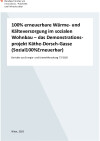
100 % erneuerbare (Vor-Ort) Wärme- und Kälteversorgung im sozialen Wohnbau bei Erreichung eines guten Wohnkomforts. Umsetzung, Monitoring und Optimierung eines Gesamtsystems der Wärme- und Kälteversorgung, das in dieser Kombination noch nicht umgesetzt wurde (insbesondere im sozialen Wohnbau).
Schriftenreihe
77/2025
Ernst Schriefl, Felix Burian, Julian Schöberl, Helmut Schöberl, Edith Haslinger, Nándor Mihály, Stephan Kling, Annemarie Schneeberger, Franz Pranckl
Herausgeber: BMIMI
Deutsch, 119 Seiten
Downloads zur Publikation
MEIDLINGER „L“ – Partizipative und skalierbare Klimawandel- Anpassungen im Bestand an der Schnittstelle von öffentlichem und privatem Raum
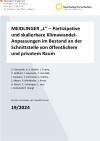
Das Projekt verfolgte einen integralen und interdisziplinären Ansatz zur Klimawandelanpassung im baulichen Bestand an der Schnittstelle von öffentlichem und privatem Raum. Es wurde ein skalier- und multiplizierbares Modell für Wien und andere Städte entwickelt.
Schriftenreihe
19/2024
S. Formanek, A. K. Briefer, L. Franta, V. Gebhart, I. Haymerle, C. Henöckl, I. Homeier, C. Kirchmair, S. Kotrba, S. Mayer, P. Minixhofer, J. Preiss, A. Rauch, C. Scharinger, L. Seel, J. Simhandl, R. Stangl
Herausgeber: BMK
Deutsch, 119 Seiten
Downloads zur Publikation
Smart Pölten 2.0 - Ganzheitliche Betrachtung einer Vertical Farm in Vorbereitung eines Demonstrationsprojektes in St. Pölten
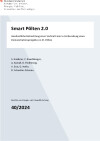
Die Stadt St. Pölten sieht in Vertical Farming großes Potential hinsichtlich der Ziele des Smart City-Konzeptes durch die Verknüpfung von lokaler Lebensmittelproduktion, Lebensqualität und Reduktion des Ressourcenverbrauchs. Um dieser Zielsetzung gerecht zu werden sollen Vertikale Farmen an Bestandsgebäuden entwickelt werden. Öko-soziale und sozio-ökonomische Betrachtungen spielen hierbei mit eine tragende Rolle.
Schriftenreihe
40/2024
S. Haiderer, C. Rauchberger, A. Kumpf, D. Podmirseg, V. Enzi, G. Hofer, D. Schneller-Scharau
Herausgeber: BMK
Deutsch, 149 Seiten
Downloads zur Publikation
Essbare Seestadt - Grüne Seestadt - Lernen für die essbare Stadt der Zukunft
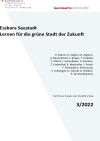
Das Projekt "Essbare Seestadt" ermittelt, welchen Beitrag verdichtete urbane Nahrungsmittelproduktion zu einem klimaneutralen, resilienten Stadtteil leistet bzw. leisten kann und wie dieser Beitrag nachhaltig stabilisiert bzw. optimiert werden kann.
Schriftenreihe
3/2022
D. Marek, D. Ziegler, M. Angerer, A. Bauernfeind, C. Berger, T. Drapela, C. Fötsch, I. Gusenbauer, S. Kummer, T. Lindenthal, R. Mayrhofer, J. Posch, F. Reinwald, K. Rimanoczy, S. Schweiger, D. Stanzel, B. Waltner, R. Weichselbaumer
Herausgeber: BMK
Deutsch, 209 Seiten
Downloads zur Publikation
Hocheffiziente Fassaden- und Dachbegrünung mit Photovoltaik-Kombination. Optimale Lösung für die Energieeffizienz in gesamtökologischer Betrachtung (GrünPlusSchule@Ballungszentrum)
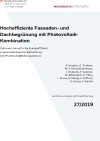
Im Rahmen dieses Projektes wurden an einer Wiener Schule unter Einbindung von SchülerInnen, unterschiedliche Gebäudebegrünungs-Systeme und Pflanzen-/Substratarten, kombiniert mit verschiedenen PV-Modulen, untersucht und ihre Einflüsse auf das hygrothermische Verhalten der Gebäude, Energiesparpotential, Raumluftqualität, Luftfeuchtigkeit, Beschattung, Lärmminderung, Wasserrückhaltung und des Wärmeinseleffekts wissenschaftlich erläutert.
Schriftenreihe
27/2019
A. Korjenic, D. Tudiwer, M. S. Penaranda Moren, J. Hollands, T. Salonen, M. Mitterböck, U. Pitha, I. Zluwa, R. Stangl, J. Kräftner, K. Gump, G. Becker
Herausgeber: BMVIT
Deutsch, 137 Seiten
Downloads zur Publikation
Innovatives Finanzierungs- und Geschäftsmodell für PV Gemeinschaftsanlagen auf Mehrparteienhäusern zur Vor-Ort Nutzung
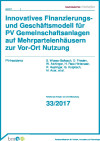
Ziel war, ein Geschäftsmodell zu entwickeln, um die verstärkte Errichtung von Photovoltaik (PV)-Anlagen auf Mehrparteienhäusern mit Eigennutzung des Stroms durch die Bewohner zu ermöglichen. Durch Einbindung der Kommune wird Überschussstrom an sie zur Vor-Ort Nutzung geliefert. Als Basis des Geschäftsmodells wurden mit Stakeholdern technische, rechtliche, administrative, nutzerbasierte, wirtschaftliche Barrieren analysiert und Lösungsansätze eruiert.
Schriftenreihe
33/2017
S. Woess-Gallasch, D. Frieden, W. Aichinger, H. Rest-Hinterseer, R. Haslinger, G. Korpitsch, M. Auer, et al.
Herausgeber: BMVIT
Deutsch, 150 Seiten
Downloads zur Publikation
TANZ – Sondierung Reallabor. Tourismus als Chance für die Energiewende im Pinzgau
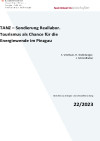
Sondierung für ein regionales Reallabor zur Beschleunigung der Klimaneutralität Österreichs 2040 in der Tourismusregion Pinzgau. Basierend auf zahlreichen Vorarbeiten wurden Realtests für die Innovationsfelder Sektorkopplung, Energiegemeinschaften und Nachhaltige Wärmelösungen konzipiert, die Organisationsstruktur des Reallabors erarbeitet und relevante Akteur:innen aktiv eingebunden.
Schriftenreihe
22/2023
S. Vitzthum, R. Stollnberger, J. Schmidhuber
Herausgeber: BMK
Deutsch, 59 Seiten
Downloads zur Publikation
Mission KS 30 - Mission Klagenfurt: klimaneutral und smart bis 2030
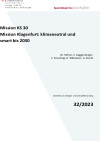
Aktualisierung der Smart City Strategie (SCS) Klagenfurt zur Erreichung der Klimaneutralität bis 2030 und die Anpassung der Indikatoren an die Sustainable Developement Goals (SDGs) der UN. Erfüllung der Teilnahmebedingungen zur urbanen Mission von Horizont Europe „100 Climate-neutral Cities by 2030“.
Schriftenreihe
32/2023
W. Hafner, S. Guggenberger, C. Petschnig, D. Wilhelmer, A. Storch
Herausgeber: BMK
Deutsch, 28 Seiten
Downloads zur Publikation
Energieschwamm: Das Gebäude als Energieschwamm - Strom rein - Wärme raus
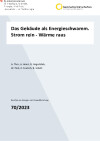
Ziel war die Entwicklung und Demonstration in Praxistests von innovativen, dynamischen Regelungskonzepten in Kombination mit (Außenluft-) Wärmepumpen, welche durch Einzelraumregelung mit Überhöhungen bzw. Absenkungen von Raumtemperaturen zu einer bestmöglichen Wärmespeicherung von Strom (PV-Eigenverbrauch bzw. Netz-Überschussstrom) in der Gebäudemasse von Mehrfamilien-Gebäuden bei bestmöglichen aber auch variablen Komfortparametern führen. Wichtige Faktoren und Motivatoren für die Nutzerakzeptanz sollen ermittelt werden, als Basis für die Entwicklung von potentiell erfolgreichen Geschäftsmodellen.
Schriftenreihe
70/2023
A. Thür, A. Heinz, R. Ungerböck, W. Pink, K. Fuetsch, B. Schett
Herausgeber: BMK
Deutsch, 69 Seiten
Downloads zur Publikation
Energie- und lebensqualitätsoptimierte Planung und Modernisierung von Smart City-Quartieren (Smart City MIKROQUARTIERE)
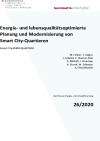
Das Projekt SC_Mikroquartiere zeigt Möglichkeiten der Stadtplanung für eine quartiersweise Entwicklung hin zu einer Low-Carbon City mit hoher Lebensqualität und guter Resilienz unter Berücksichtigung vorhandener und geplanter Gebäude, Infrastruktur und Nutzung. Das zentrale Element ist die Modellierung von Stadtstrukturen auf Mikroquartiersebene.
Schriftenreihe
26/2020
M. Fellner, T. Zelger, J. Leibold, V. Huemer-Kals, A. Kleboth, I. Granzow, A. Storch, W. Schieder, A. Fleischhacker
Herausgeber: BMK
Deutsch, 351 Seiten
